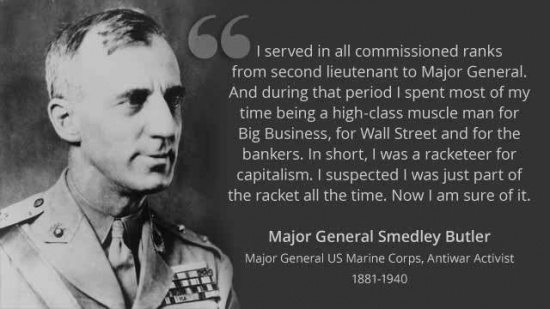Smedley Butler
(soldier, whistleblower, activist) | |
|---|---|
 | |
| Born | 1881-07-30 West Chester, Pennsylvania, U.S. |
| Died | June 21, 1940 (Age 58) Philadelphia, Pennsylvania, U.S. |
| Exposed | • Business Plot • War profiteering • US/Marine Corps |
| Interests | • War profiteering • American fascism |
A US general who exposed the coup that financiers had planned for USA. | |
Major General Smedley Butler is a US general turned whistleblower who became a peace activist, arguing most famously that "War is a Racket". He exposed the Money Trust's Business Plot, which limited the reach of the US deep state until it regrouped during WW2.
Contents
Business Plot
- Full article: Business Plot
- Full article: Business Plot
In 1933 Butler was chosen to lead a coup in USA by the Money Trust, who sought a military leader who was popular with the rank and file. He went along with it, gathering information until in November 1934, he blew the whistle on the plan. Although there was a congressional hearing, the whole event was nearly memory holed by the US deep state, who used commercially-controlled media to try to hide the truth, and the principal actor, Gerald C. MacGuire, who contacted Smedley Butler died suddenly in 1935. However, sufficient records exist to prove what happened, and the event is termed the Business Plot.
Anti-war activism
In 1935 he published the famous "War is a Racket", exposing the workings and hidden purposes the United States' foreign interventions, detailing the subversion of the US government by corporations and other deep state powers.
FOIA requests
Caitlin Russell of MuchRock made a FOIA request for any FBI files mentioning Smedley Butler.[1] Her response from this request was sufficient to tell that the "no responsive documents" answer which the FBI made twice to her request about Gerald C. MacGuire was incorrect.[2]
A Document by Smedley Butler
| Title | Document type | Publication date | Subject(s) | Description |
|---|---|---|---|---|
| File:Warisaracket.pdf | book | 1935 | War | The classic insider's denunciation of war. Easily readable in one sitting, it is sadly just as relevant to the situation facing humanity in the early 21st century as it was when first published a few years before the carnage of World War II. |
Related Document
| Title | Type | Publication date | Author(s) | Description |
|---|---|---|---|---|
| Document:McCormack–Dickstein Committee | testimony,Congressional hearing | 1934 | McCormack-Dickstein Committee |